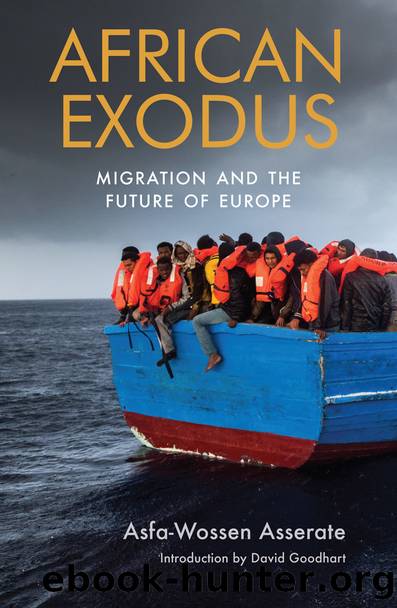African Exodus: Migration and the Future of Europe by Asfa-Wossen Asserate

Author:Asfa-Wossen Asserate [Asserate, Asfa-Wossen]
Language: eng
Format: epub
Tags: Ethnic Studies, Migration, Non-Fiction, Social Science
ISBN: 9781910376911
Google: sudRDwAAQBAJ
Publisher: Haus Publishing
Published: 2018-02-15T00:00:00+00:00
Africa’s test: the population explosion
Surely the greatest test for Africa will be whether and how it can begin to rein in its rapid growth in population. There are currently around 7.54 billion people on Earth, and every minute this figure increases by 159. According to forecasts by the German Foundation for World Population, the global population will have grown to 8.6 billion by 2030 and 9.8 billion by 2050.114 In its latest estimate of population, the UN projected that the number of people on Earth will have reached 11.2 billion by 2100. The most rapid growth in population is taking place primarily in Asia and Africa. In mid-2017, there were some 1.25 billion people living in Africa. By 2030 this number will likely climb to 1.71 billion and by 2050 to 2.57 billion. The most dramatic increase is in countries south of the Sahara. By 2050 this region, with an estimated population in that year of almost 2.2 billion, will be home to double the number of people currently living there (estimated as 1 billion in 2017). Worldwide, over the past 50 years, the average number of children a woman gives birth to has halved from 5 to 2.5. By contrast, in sub-Saharan Africa the number has decreased much more slowly over the same period, from 6.6 to 5.
Several factors have been held responsible for this unchecked growth in population. For one thing there is the young age distribution on the African continent. Over half of all Africans are now below 25 years of age, with around 40 per cent aged less than 15. In 2015, the three nations with the youngest age profiles were all in Africa: the average age in Mali was 16.1, in Uganda 15.6 and in Niger just 15.2.115 All these young people still have their child-bearing years ahead of them. Another factor is the large number of unwanted births. There is a serious lack of sex education and advice, and above all of access to contraceptives. While around 70 per cent of married women in Europe use contraceptives of one kind or another, in sub-Saharan Africa that figure drops dramatically to only 30 per cent.116 Many African women deliberately choose to have lots of children. They regard large families as the best form of social security, in the absence of provision by the state for care in old age. If one or two of those many children survive, the theory goes, then they will be able to look after their parents in later life.
This is not a specifically African problem. Well into the nineteenth century, large families were also the norm in Europe. A peasant woman in the Middle Ages bore on average five to six children, while in the Early Modern period it was not uncommon for a woman to give birth as many as 20 times over the course of her marriage. A large number of the offspring would die before reaching adulthood, often soon after their birth. Squalor, lack of hygiene, epidemics, hunger and wars all contributed to this high rate of infant mortality.
Download
This site does not store any files on its server. We only index and link to content provided by other sites. Please contact the content providers to delete copyright contents if any and email us, we'll remove relevant links or contents immediately.
| Africa | Americas |
| Arctic & Antarctica | Asia |
| Australia & Oceania | Europe |
| Middle East | Russia |
| United States | World |
| Ancient Civilizations | Military |
| Historical Study & Educational Resources |
Goodbye Paradise(3810)
Men at Arms by Terry Pratchett(2837)
Tobruk by Peter Fitzsimons(2518)
Borders by unknow(2315)
Arabs by Eugene Rogan(2299)
Pirate Alley by Terry McKnight(2221)
More Than Words (Sweet Lady Kisses) by Helen West(1867)
Belonging by Unknown(1857)
It's Our Turn to Eat by Michela Wrong(1731)
The Biafra Story by Frederick Forsyth(1656)
The Source by James A. Michener(1613)
Botswana--Culture Smart! by Michael Main(1602)
Coffee: From Bean to Barista by Robert W. Thurston(1545)
A Winter in Arabia by Freya Stark(1538)
Gandhi by Ramachandra Guha(1532)
The Falls by Unknown(1526)
Livingstone by Tim Jeal(1489)
The Shield and The Sword by Ernle Bradford(1409)
Africa: Altered States, Ordinary Miracles by Richard Dowden(1384)
